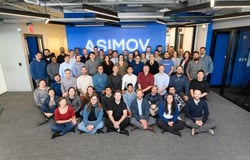Position Summary
Cellares is seeking an innovative and highly motivated Scientist with broad experience in cell therapy manufacturing, and specific expertise in late-stage process characterization to join the Process Development team. This individual will interface across many parts of the company and play a key role in advancing the reliability and consistency of cell therapy manufacturing processes. This Scientist will drive the design, execution, and analysis of critical experiments aimed at establishing robust manufacturing parameters for client and internal processes. Collaborating closely with cross-functional teams, you will lead efforts to optimize and validate processes that ensure high-quality cell therapy products.
The ideal candidate will be a strong technical contributor and cross-functional collaborator with demonstrated experience developing, characterizing and deploying robust autologous and allogeneic cell therapy processes.
Candidates should enjoy working in a fast-paced, mission-driven environment, and be prepared to tackle a broad selection of challenges as the company grows.
Responsibilities
- Spearhead process characterization studies to identify and establish critical process parameters (CPPs) and critical quality attributes (CQAs) to ensure consistent, high-quality manufacturing outputs
- Develop and execute statistically sound experimental designs to evaluate process robustness and scalability, including Design of Experiments (DOE) methodologies
- Analyze complex datasets to identify key trends, optimize parameters, and implement data-driven decisions
- Collaborate with internal and client-facing manufacturing, MSAT, quality, and regulatory teams to define process requirements and ensure alignment with industry standards and regulatory guidelines
- Author and review technical reports, study protocols, and regulatory submissions, providing scientific justification for established parameters and outcomes
- Lead cross-functional teams in root cause analysis and troubleshooting to address process inconsistencies, identifying areas for improvement to support continuous process optimization
- Provide technical guidance and mentorship to junior team members, fostering a culture of innovation, data integrity, and scientific excellence
- Serve as subject matter expert where appropriate for the cell and gene therapy process, provide technical insights and support in troubleshooting and root cause investigations
Requirements
- Bachelor's, Master's or PhD in Bioengineering, Chemical Engineering, Biology, Biochemistry, or related field with 3-15 years of process development experience in the cell and gene therapy field
- Strong expertise in process characterization, Design of Experiments (DOE), and statistical analysis, with a preference for experience using statistical software such as JMP
- Familiarity working in a GMP and/or Clinical Manufacturing setting strongly preferred
- Experience designing scale-up experiments and troubleshooting semi-automated instruments
- Hands-on experience with autologous and/or allogeneic cell therapy manufacturing processes
- Excellent verbal and written communication skills; able to interpret, summarize, and present scientific results in a clear, concise, accurate manner to both technical and non-technical audiences
- Experience with flow cytometry and cell based assays preferred
- Strong understanding of cell biology and immunology
- Creative, self-motivated, eager to take on a wide variety of tasks and grow with the evolving technology.
This is Cellares
Cellares is the first Integrated Development and Manufacturing Organization (IDMO) and takes an Industry 4.0 approach to mass manufacturing the living drugs of the 21st century. The company is both developing and operating integrated technologies for cell therapy manufacturing to accelerate access to life-saving cell therapies. The company’s Cell Shuttle integrates all the technologies required for the entire manufacturing process in a flexible and high-throughput platform that delivers true walk-away, end-to-end automation. Cell Shuttles will be deployed in Cellares’ Smart Factories around the world to meet total patient demand for cell therapies at global scale. Partnering with Cellares enables academics, biotechs, and pharma companies to accelerate drug development and scale out manufacturing, lower process failure rates, lower manufacturing costs, and meet global patient demand.
The company is headquartered in South San Francisco, California with its commercial-scale IDMO Smart Factory in Bridgewater, New Jersey. The company is backed by world-class investors and has raised over $355 million in financing.
Leveling will be based on overall experience, education, and demonstration of knowledge throughout the interview process.
Top Skills

What We Do
Cellares is revolutionizing cell therapy manufacturing. We are developing a one-of-a-kind solution, The Cell Shuttle, to overcome the challenges associated with manufacturing so these life-saving therapies are affordable and widely available to patients who can benefit.
The clinical impact of cell therapy in treating cancer has been proven, but this therapeutic approach has several limitations, especially in manufacturing, leaving extremely sick patients waiting for treatment and desperate for hope.
Since cell therapy is currently produced for a single patient at a time, it is expensive to manufacture, requiring significant time and resources, and is difficult to scale.
Preclinical and clinical scientists, as well as commercial cell therapy manufacturers also lack the options to fully automate their manufacturing process quickly, safely, cost-effectively and at the scale they need.
The Cell Shuttle is an automated and closed end-to-end manufacturing solution that is flexible and scalable, enabling customers to run exact processes specified for their cell therapy. Compared with the current manual manufacturing processes for cell therapy, the Cell Shuttle’s next-generation automated manufacturing solution has 10 times the scalability (meaning 10 times more patient doses can be produced simultaneously), enables a three-fold reduction in process failure rates and will reduce the per-patient manufacturing cost by up to 70 percent for most processes.










